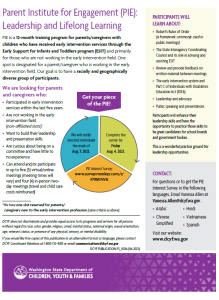As parents and caregivers, learning to effectively advocate for their children can be a difficult learning curve. But once this is achieved, family leaders can reach out beyond their own family and advocate on behalf of many children who have special health care needs. While it may be daunting to step into that larger world, family voices are one of the most powerful forces for change in our society. Here are some tools and organizations that can help you step up your advocacy game.
Washington Family Engagement has a Parent Leadership Training Institute which is a free, 12-week online course that teaches parents and those who care for children to understand systems and develop community, school engagement, and public speaking skills. As a graduation requirement, parents develop a project that benefits their schools and communities. The course offers five free elective college credits for those who graduate. The Parent Leadership Training Institute Spring Course will be available in English and Spanish, and will start on February 25th.
Several organizations teach workshops and classes entitled “Telling Your Story with a Purpose.” These workshops are intended to help you refine your thoughts and personal stories to effectively communicate your needs and the needs of your community to legislators and other officials. PAVE, DadsMOVE, and various Parent to Parent groups present these regularly, and upcoming events of this nature can be viewed on the Family to Family calendar.
Getting involved with one of the many family-led organizations that focus on children and youth with special health care needs (CYSHCN), as a volunteer, committee member, or board member can take your advocacy to a whole new level. Here are four statewide CYSHCN that you can be a part of:
Dads M.O.V.E. is a father-led organization for families who have children and youth with behavioral health issues.
PAVE supports children and youth with special needs, with an emphasis on those with intellectual and developmental disabilities.
Washington State Community Connectors centers on behavioral health challenges of children and youth, focusing on community-based solutions.
Washington State Parent to Parent (P2P) has county level offices, where parents of children youth with special health care needs can aid one another and advocate for children with special needs.


